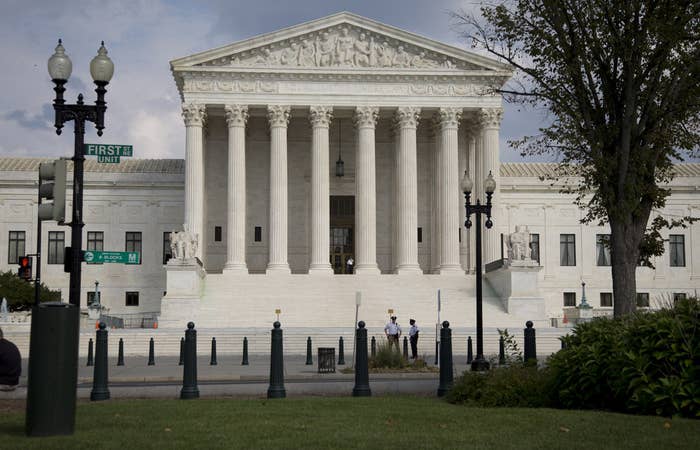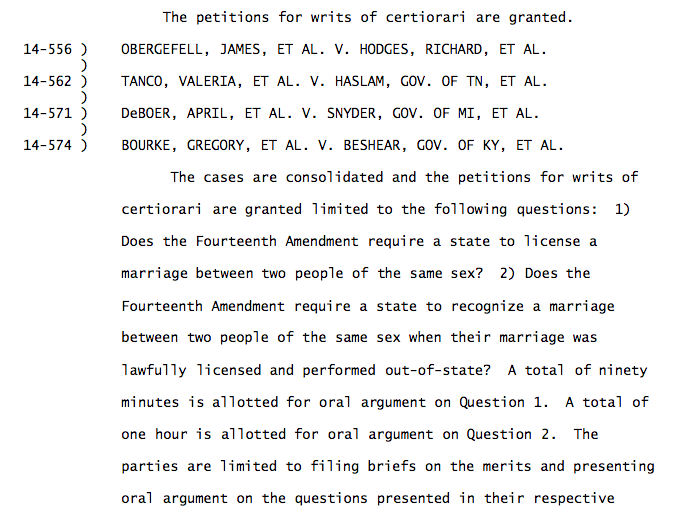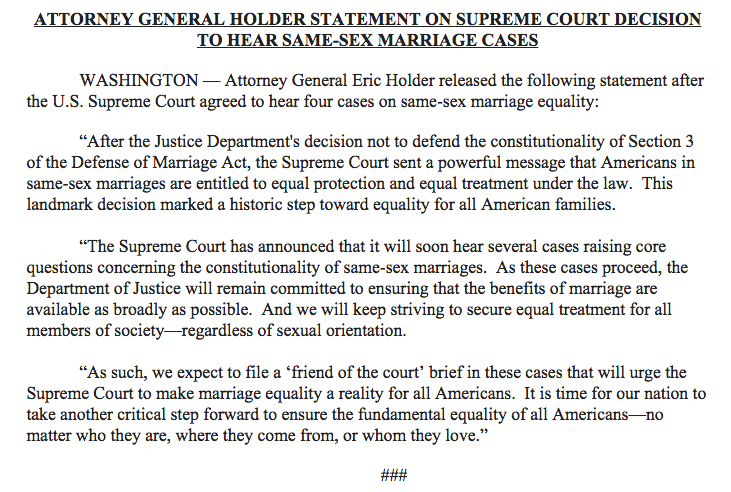
WASHINGTON — The Supreme Court announced on Friday that it will take up four cases challenging state bans on same-sex couples' marriages — a long anticipated move that could lead to nationwide marriage equality.
The cases ask the justices whether Kentucky, Michigan, Ohio, and Tennessee bans on same-sex couples' marriages and bans on recognition of same-sex couples' marriages from out of state violate the Constitution's due process and equal protection guarantees.
The two questions granted by the court for argument are: 1) "Does the Fourteenth Amendment require a state to license a marriage between two people of the same sex?" and 2) "Does the Fourteenth Amendment require a state to recognize a marriage between two people of the same sex when their marriage was lawfully licensed and performed out-of-state?"
There will be 90 minutes of argument on the marriage question and 60 minutes of argument on the marriage recognition question, per the court's order.
The coming showdown before the justices over same-sex couples' marriage rights has quickly become seen as inevitable following the Nov. 6, 2014, decision of the 6th Circuit Court of Appeals to uphold the bans in Kentucky, Michigan, Ohio, and Tennessee. The ruling set up a disagreement with other appeals courts to have considered the issue; the 4th Circuit, 7th Circuit, 9th Circuit, and 10th Circuit courts of appeals all have struck down such bans on various grounds.
The justices generally step in once such a circuit split has been created — a fact referenced last year by Justice Ruth Bader Ginsburg when she was discussing the pending marriage cases across the country — and, on Friday, the justices took the leap.
This will be the second time the justices take on the issue. In March 2013, the Supreme Court heard arguments over the constitutionality of California's Proposition 8 marriage amendment. Come June 2013, however, the court dismissed the case on a technicality — leaving the final resolution of the question for another day.
The justices did, however, decide that the Defense of Marriage Act's federal ban on recognition of same-sex couples' marriages is unconstitutional — a decision that set up the wave of decisions striking down state bans in the year and a half since.
As of now, 35 states and Washington, D.C., have marriage equality, with same-sex couples marrying in some counties in two other states: Kansas and Missouri. That leaves 13 states in which there is no legal right for same-sex couples to marry. In addition to the four states seeking review on Friday, the other states include Louisiana, Mississippi, and Texas — in which the 5th Circuit Court of Appeals heard appellate arguments earlier this month — as well as Alabama, Arkansas, Georgia, Nebraska, North Dakota, and South Dakota.
Now, lawyers and outside parties will raise the question about state laws to the justices again in briefs that will be filed in coming months.
The same-sex couples plaintiffs' briefs will be due by 2 p.m. Friday, Feb. 27. The states' briefs will be due by 2 p.m. Friday, March 27. The reply briefs from the plaintiffs will be due by 2 p.m. Friday, April 17.
Then, likely in late April, the justices will hold arguments over the issue — which would mean a decision, and possible nationwide resolution of the issue, would be expected by late June.
Attorney General Eric Holder says the U.S. will file a brief in the cases "urg[ing] the Supreme Court to make marriage equality a reality for all Americans."
In California's Proposition 8 case, the Obama administration backed the same-sex couples suing to have the ban struck down, but the Justice Department did so in a brief that did so based on a limited argument that only would have ended bans in California and seven other states.
Now, however, the administration will be going for nationwide resolution — something that Holder has said previously the Justice Department would do if the court accepted a case on the issue for review.
Here is the order from the Supreme Court:


Here is Holder's full statement:

